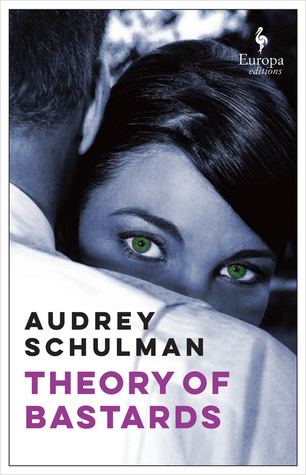Review: Audrey Schulman’s “Theory of Bastards”
by Miles Raymer
I expect any worthwhile novel to touch on a smattering of my intellectual interests, weaving them together in a fresh and entertaining fashion. It is rare, however, for a single story to engage with a manifold range of subjects about which I am deeply passionate, and rarer still for that synthesis to prove itself more artful than awkward. Audrey Schulman’s Theory of Bastards is one such story. This unique and captivating book explores the nature of evolution and the scientific endeavor, the benefits and risks of near-future technology, the impacts and nuances of physical pain, the anxieties and dangers of climate change, the intricacies of human and primate relationships, and the undercurrent of existential uncertainty that runs through all life.
Lest you should find the above description overly abstract, let me assure you that Theory of Bastards is a highly readable and grounded novel. Schulman’s prose displays a keen eye for detail, her voice fueled by a psychological and linguistic depth that is blissfully devoid of pretense. The narrative unfolds from the perspective of Dr. Francine (Frankie) Burke, one of the best protagonists I have encountered in years. A self-proclaimed “superhero with the ability to fly, but not to land,” and “necessary experiment in genetic diversity,” Frankie is complex, ornery, and instantly likeable––a woman who elicits sympathy while simultaneously commanding respect (102).
When we meet her, Frankie is a newly-anointed MacArthur fellow researching the field of evolutionary mating behavior. Empowered by the prestige of her award, she decides to conduct her next research project by observing a tribe of bonobos at a great ape sanctuary in Schulman’s near-future imagining of the American Midwest. The reader is immediately immersed in Frankie’s moment-to-moment experience, which is characterized by an unpredictable vacillation between agonizing physical pain and intense flurries of scientific inquiry. The source of her bodily difficulty is a lifelong battle with endometriosis. Frankie’s scientific understanding of and intimate relationship with pain is a cornerstone of her outlook on life:
She understood pain was necessary in the world, a sense as critical as sight or hearing. It functioned to keep people safe, a very persuasive stop sign. In a way it was the mother to us all, slapping us back from the hot stove, forcing us to put down the sharp knife, teaching us self-preservation, training care into our bones…In smaller doses, it could be a sign of improvement and increasing strength: the ache of muscles growing, the gasp of lungs strengthening, a soul learning to endure in order to fulfill its desires…Unstoppable pain was different. The sensation in this case was not a mother. It was an abuser. It taught nothing. Instead it wrapped itself around the ribs, settled on the shoulders, a weight to be borne, making it hard to breathe or talk. (169-70)
Schulman jumps back in time periodically to reveal parts of Frankie’s past, showing not only how endometriosis caused her tremendous suffering, but also how it taught her to focus, to blot out everything except the task at hand and excel where others could not. Frankie’s grit and endurance are inspiring.
As she recovers from a surgery that may finally have eradicated her debilitating condition, Frankie throws herself into a close examination of the extraordinary sexual practices of bonobos. Aided by the sanctuary’s staff and her “BodyWare,” Frankie earns the respect of the tribe and learns how to study them with minimal impact on their daily routines. BodyWare is a network of physical implants that are connected to each other and to the Internet; these implants augment Frankie’s sensory perception and improve her ability to record, store, and visualize data. Schulman’s projections of how such technology could change human behavior and social interaction are believably balanced, demonstrating neither histrionic degradations nor irreproachable improvements.
Frankie’s near-constant human companion is David Stotts, an assistant she selected from the group of researchers who were already present at the sanctuary when she arrived. Stotts is a laconic, reserved individual––a military man turned prehistorical researcher. As his relationship with Frankie develops, Stotts reveals himself to be a model of male decency and competence. He occasionally feels like a placeholder for the ideal modern man, but even if he’s more archetype than anything else, he’s a noble and refreshing one. While studying the bonobos, Frankie and Stotts grow closer, gaining trust and mutual understanding through their shared desire to care for and analyze these endearing primates.
After stalling somewhat about two-thirds of the way through, Theory of Bastards reignites with a post-apocalyptic turn in its latter act. This could have spelled disaster for an otherwise-brilliant novel, but Schulman stays focused on the small stuff, refusing to give into the pat grandiosity that ruins many such stories. Though Theory of Bastards is too intelligent to condemn technological progress outright, it seduces the reader into confronting the question of what’s left when our fancy gizmos give out:
How helpless we are without technology, naked and defenseless, a soft-limbed creature without wings or fins, our oversized cerebellum able only to grasp the sheer expanse of an ocean. (371)
Even better is how Frankie and her companions learn to accept life’s ineluctable failures and savor the gratitude that attends small victories:
She knew now the experience of loss was a prerequisite to holding anything tight enough to feel it. (379)
By threading the needle between hopelessness and naivety, Audrey Schulman has produced a commendable and touching work of speculative fiction.
Rating: 9/10
